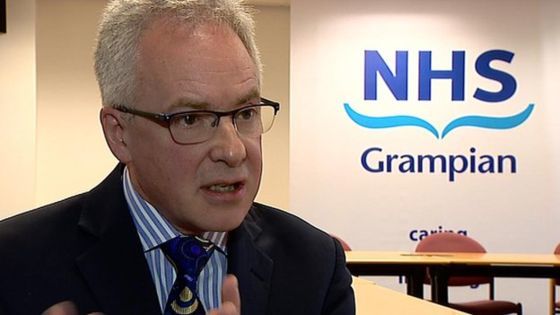A health board has been fined £8,000 for failing to ensure the safety of a dementia patient who escaped from a hospital ward before being found dead in a canal a week later.
Alexander Gerrard, who was known as Sandy, absconded from the former Bonnybridge Hospital, near Falkirk, in May 2011.
The 69-year-old was originally from Aberdeen, but had lived in Bonnybridge for several years when he went missing.
A few hours after he went missing, he was spotted more than seven miles away on the outskirts of Kilsyth, North Lanarkshire.
Police launched a major search involving specialist dogs, police search experts, fire and rescue service thermal imaging equipment and a police helicopter.
Posters featuring his photograph were also released.
But his body was found by a member of the public a week later, in the Forth and Clyde Canal at Auchenstarry, near Kilsyth.
Falkirk Sheriff Court heard that Mr Gerrard had made an earlier, unsuccessful attempt to abscond from the hospital six days earlier, but NHS officials had failed to carry out “a suitable and sufficient assessment” of the risk of him doing it again.
He was reported missing from the unit, on Falkirk Road, Bonnybridge, around 9pm on May 10, 2011, having been last seen on the ward between 3pm-5pm.
NHS Forth Valley Health Board yesterday pleaded guilty to failing to assess the risks to Mr Gerrard’s health and safety, contrary to 1999 Management of Health and Safety at Work Regulations.
Sheriff Derek Livingston imposed an £8,000 fine.
The health board closed Bonnybridge Hospital just seven month later, with its staff and patients transferred to the Falkirk Community Hospital. The site was later sold for housing.
A spokeswoman for NHS Forth Valley said last night: “We are very sorry for the circumstances surrounding this patient’s death in May 2011 and would like to again apologise to the family for the distress this has caused.
“A number of actions have been carried out to address the shortcomings identified as a result of both our own internal investigation and the subsequent investigation carried out by the HSE.”
Health chiefs must act
The widow of an Alzheimer’s patient whose treatment was condemned by a watchdog says health chiefs must act to protect other vulnerable people.
Teresa Canale-Parole is still waiting for the apology NHS Grampian was told to make for “significant failings” in its care of John Deighan.
But she said adopting a charity’s call for open-ended visiting for dementia sufferers’ families would be more meaningful than words.
John’s Campaign, set up after the death of novelist Nicci Gerrard’s father, says they should enjoy the same rights as those visiting children.
The Scottish Public Services Ombudsman upheld Ms Canale-Parole’s complaints about a catalogue of errors by specialist dementia units at the Royal Cornhill Hospital in Aberdeen and Glen O’Dee in Banchory.
Its probe – which concluded that offshore worker Mr Deighan suffered more than he need have in his final months – was the result of a gruelling three-year battle to get the board to accept any responsibility.
Portlethen-based Ms Canale-Parole said the family “still haven’t grieved properly because we can’t get over the anger”.
Along with daughters Kara and Krysta, the professional carer has become closely involved with John’s Campaign, recently addressing a London conference and meeting others with similar stories.
“If they said ‘yes, we’ll go with John’s Campaign’ that would make me feel so much better,” she said.
“That would do even better than a sincere apology because I would know they really were doing something.
“People with dementia are like children – they are frightened, they are scared, they are in a strange environment.
“To have someone they know close to them can help with the care.”
She said she hoped the ombudsman’s report – which heavily criticised NHS Grampian’s “dismissive, defensive” attitude to her complaints – “brings to light that people don’t deserve to be treated in this way and that people have every right to complain”.
An NHS Grampian spokeswoman said the health board was “in the process of addressing the ombudsman’s report’s recommendations” which include reviews and an apology by October 28.
She added: “NHS Grampian adopts a person-centred approach to visiting which is tailored to the individual patient group, at the same time promoting access for visitors.
“We will be reviewing this in the light of the ombudsman’s recommendations.”
